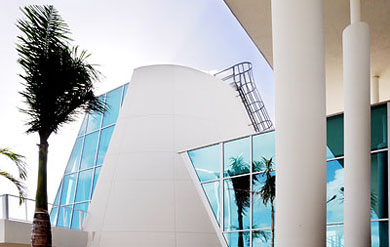
The University of the Virgin Islands Research and Technology Park’s (RTPark) 64 West Center building was awarded Leadership in Energy and Environmental Design (LEED)® Silver Certification in August. LEED, which was developed by the U.S. Green Building Council (USGBC), is the nation’s preeminent program for the design, construction and operation of high performance green buildings. The 64 West Center building is located on UVI’s Albert A. Sheen Campus on St. Croix.
“The RTPark’s LEED certification demonstrates tremendous green building leadership,” said Rick Fedrizzi, USGBC president, CEO and founding chair. “The urgency of USGBC’s mission has challenged the industry to move faster and reach further than ever before, and the RTPark’s 64 West Center serves as a prime example with just how much we can accomplish.”
The Center achieved LEED certification by incorporating sustainable strategies throughout the project’s design, construction and operational phases – including energy, lighting, water and material uses – which in turn reduces greenhouse gas emissions, contributes to a healthier environment for visitors and tenants, and lowers costs.
“The RTPark’s 64 West Center was the first of what now are several sustainable initiatives underway on the campuses of UVI,” said UVI President Dr. David Hall. “Environmental design and energy efficiency are key priorities for this institution because they are crucial to our territory’s well-being and the promises of the future.”
The project was designed to the standard of, and ultimately awarded, LEED Silver certification, based on a number of enhanced sustainable design features including:
- A north‐south orientation of the building’s main wing, to minimize southerly exposure and take advantage of prevailing easterly breezes
- A light exterior color, to reflect daylight radiant heat
- Storm water and rainwater management systems, to reduce facility water demands
- Permeable pavements, vegetated conveyance swales, bio‐filtration, and underground detention in rain tanks
- Underground cistern facilities, to collect rain water
- Reduced energy demands, through solar water heating, natural day‐lighting, and high‐efficiency lighting and cooling systems
- Renewable energy sources, including a roof‐mounted photovoltaic (solar array) system and wind turbine, reducing energy demand on utility power
- The use of recycled and sustainable materials, including in kitchen and bathroom countertops, restroom partitions, and in furnishings and wood finishes
- The use of polished concrete floors
- The use of locally‐produced and procured materials, including landscape vegetation, concrete benches, and artworks.
“The 64 West Center project has fostered collaboration and visionary leadership from the moment design got underway in 2006,” said David Zumwalt, RTPark executive director. “It changes the way buildings will be built in the USVI, and is a landmark for St. Croix and for the future growth of the RTPark.” The RTPark’s certification has also been verified by the Green Building Certification Institute.
The Washington, D.C.-based USGBC is committed to a prosperous and sustainable future through cost-efficient and energy-saving green buildings. Its LEED green building certification system is the foremost program for the design, construction and operation of green buildings. Over 100,000 projects are currently participating in the LEED rating systems, comprising over 8 billion square feet of construction space in all 50 states and 114 countries.
The RTPark is an economic development entity operating under a legislative mandate, and policy guidance from UVI, to develop a technology sector in the U.S. Virgin Islands. RTPark leverages certain economic assets in the territory to enable and sustain an environment affording knowledge-based businesses the opportunity to operate in a favorable near-shore setting while remaining within the jurisdiction of the U.S.

